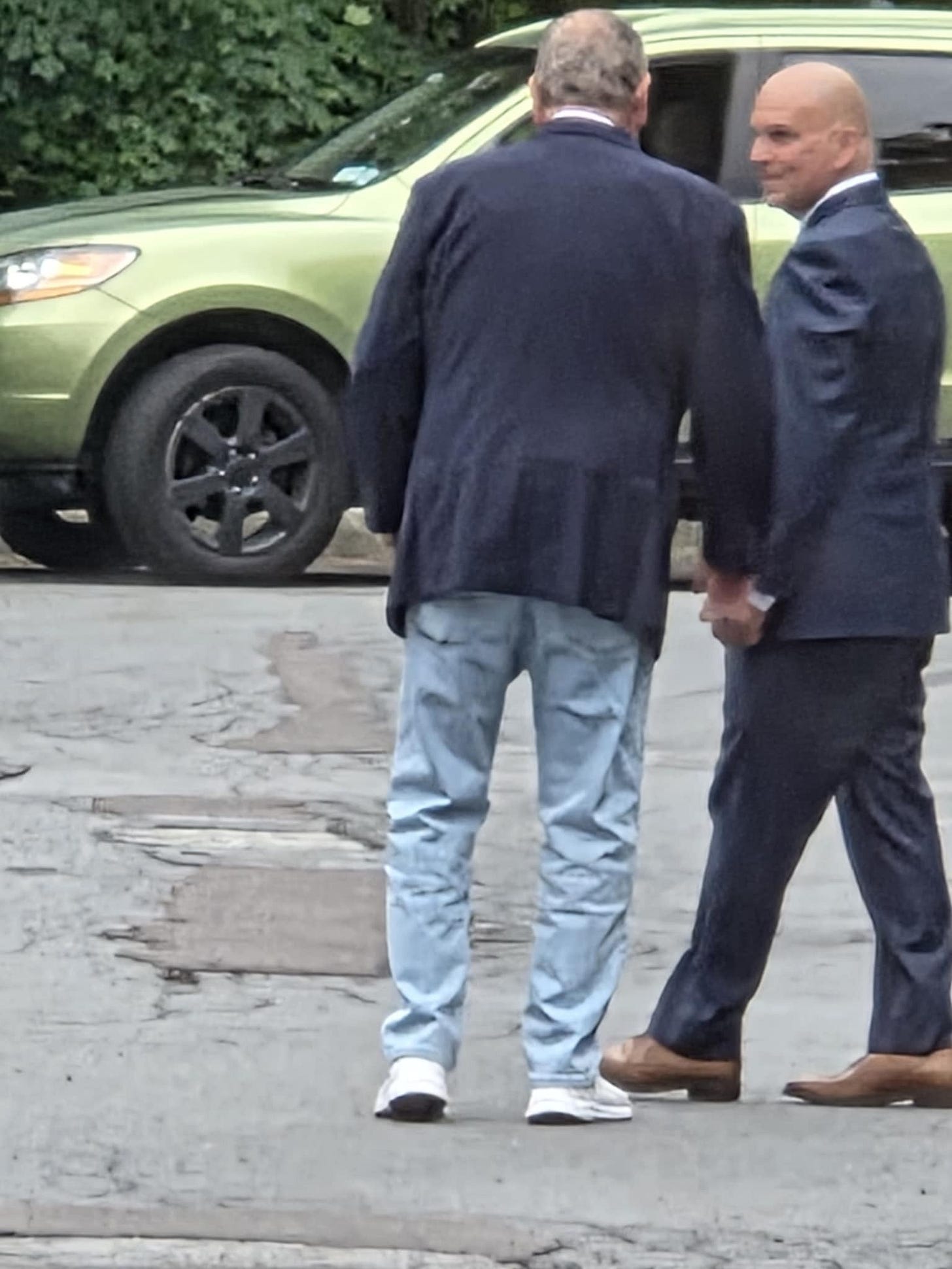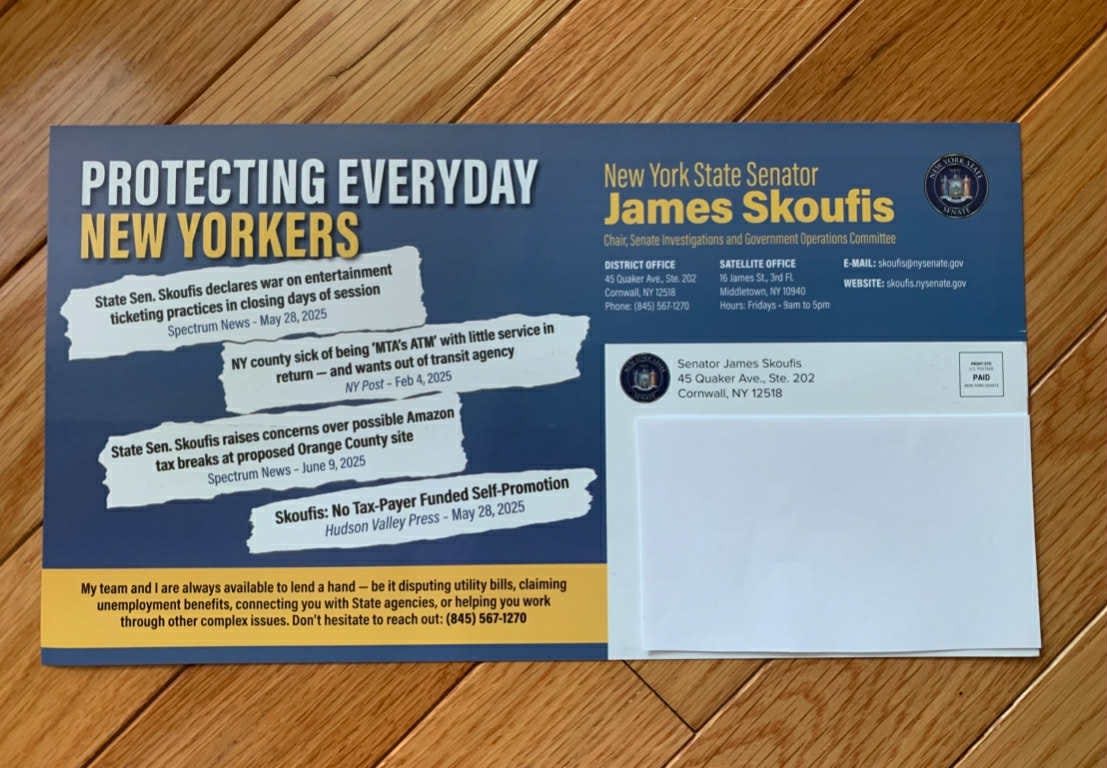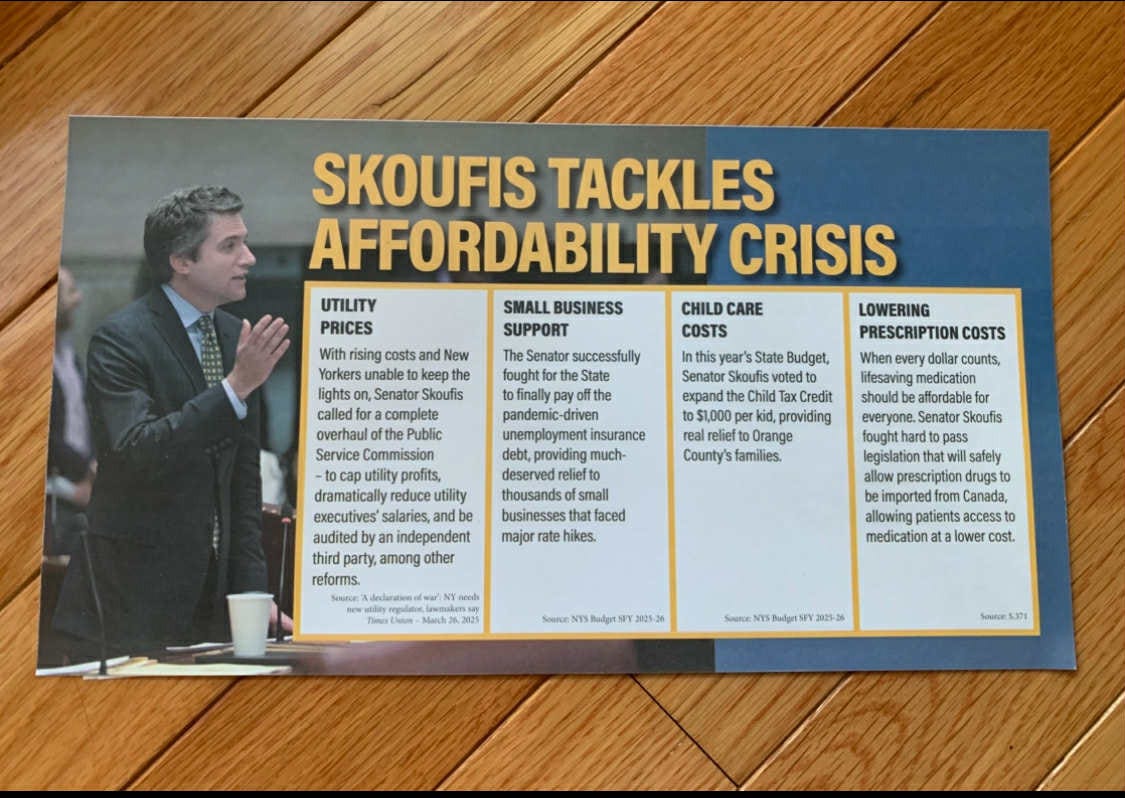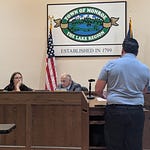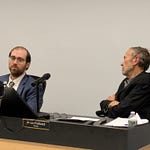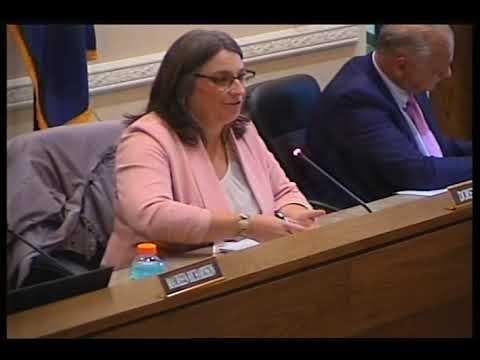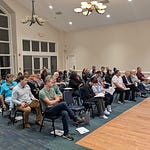(Below is an edited transcript of this week’s podcast episode, available to subscribers of The Monroe Gazette. It’s been edited for brevity and clarity. To hear the show, we hope you’ll consider subscribing. If you’re new here, with the podcast we usually do something local first, before we get into the larger New York State stories. New episodes of the podcast come out each week, unless we’re on break. So no podcast next week because of the holiday. The Monroe Gazette will resume posting on Monday, July 7th.)
Orange County Sewer District 1 Is Going To Charge Home Owners How Much?!
Hello and welcome to another edition of The Monroe Gazette. Coming to you from the George Carlin Memorial Podcast Studio. I’m your host, BJ Mendelson.
“Orange County can not and should not target specific users for adverse treatment.”
Those were the words read by members of the Orange County Sewer District 1 Advisory Committee, back at their April 2025 meeting. And just because Orange County Sewer District 1 is a mouthful, I’m going to only refer to it as OCSD1 for the rest of this episode.
This response came following requests from residents that centered around asking Orange County to charge the Simon Property Group more money for the sewer plant’s upgrade and eventual expansion.
Simon Property Group owns Woodbury Common. In the last quarter of 2024, where most businesses tend to make their money, Simon took in 1.45 billion dollars in revenue. An 8.7% increase in revenue from their Q4 2023 earnings. While it’s true revenue isn’t profit, and there are plenty of operating expenses that need to be deducted, I want you to consider something.
For those of you who don’t know, Orange County is inching closer to first upgrading the sewage capacity within OCSD1, and then building a brand new plant. This is a project that will cost nearly $200 million dollars by the time it’s finished, and most of you listening to this are going to help pay for it. Not Simon Property Group.
Pictured Above: Monroe Town Councilman, Sal Scancarello, is seen here leaving A Better Place Bar and Grill in Woodbury with a man believed to be OCSD1 Sewer Advisory Committee Chairmen, and Orange County Legislator, Peter Tuohy.
A Better Place Bar and Grill has been accused by Woodbury residents, and former employees, of hosting meetings of the violent white supremacist gang, The Proud Boys. The Monroe Gazette has reached out to A Better Place Bar and Grill owner, Annie McGuinness for comment concerning these allegations, but has not heard back from her as of this writing.
Mr. Scancarello can be seen leaving a fundraiser that was held at the bar and grill for Woodbury Town Supervisor, Kathryn Luciani, and Councilmember Kelly Rinaldi, on Thursday, June 26th, 2025. Neither Councilmember Kelly Rinaldi, Supervisor Luciani, or the Town Attorney responded to our requests for comment, concerning whether or not the Town Supervisor and Mrs. Rinaldi thought it was appropriate to host a fundraiser at this location. Mr. Scancarello, and the man believed to be Peter Tuohy, also haven’t, at the time of this writing, replied to our requests for comment.
Mr. Scancarello’s son, Anthony, was previously accused by Monroe residents of hosting a TikTok account where he threatened to murder two Satmar men inside the Monroe Target. Mr. Scancarello has not replied to repeated requests for comment concerning this TikTok account, but it has since been deleted.
While Orange County Legislator, Peter Tuohy, among others, shares rosy assessments about the ability of Orange County to secure state and federal funding to cover that cost, they have so far not been successful in securing that funding.
That means, best case scenario, residents living within OCSD1 will pay, roughly, $900 a year for the next thirty years. Worse case scenario, residents will pay nearly $1,200 a year, also for the next thirty years. Given that between 60% and 80% of Americans live paycheck to paycheck, it’s important to point out when our government puts the wealthy and the well connected ahead of everyone else. And that’s exactly what Orange County Executive Steve Neuhaus, and Orange County Legislator Peter Tuohy, are doing.
Because make no mistake, the area within OCSD1 is mostly built out. So one of two prime beneficiaries of this sewer plant upgrade and expansion is Simon Property Group. The other are our real estate developer friends in Palm Tree and South Blooming Grove.
During the May meeting of the OCSD1 Advisory Committee, Orange County Legislative Chairman, Kevin Hines, shared a story that illustrates how difficult it will be to get funding for this project.
Pictured Above: At 1:01:45 you can hear Mr. Kevin Hines tell this story. If you look at the back of Orange County Legislator Peter Tuohy’s head (far right) you can match him up with the man standing next to Monroe Town Councilman, Sal Scancarello.
Mr. Hines’s story involves our friend and yours State Senator James G. Skoufis. Currently putting out emails about how he wants to protect children, in order to repair his badly damaged reputation after spending thousands in the local primaries to support candidates working on behalf of the real estate developers.
Above: State Senator Skoufis’s email that went out this morning. It was accompanied by mailers received by Woodbury residents touting his achievements. As George Carlin once said, “Politicians have traditionally hidden behind three things, the flag, the Bible and children."
For a nuanced discussion of Kyra’s Law, which the Senator is touting, we recommend you check out the Gothamist article about it here.
Mr. Hines’s story goes like this: State Senator Skoufis called Mr. Hines late in the evening, and asked for last minute paperwork concerning the sewer plant project. A project Mr. Skoufis is well aware of, and has been for some time. So why he suddenly asked for paperwork on it at the last minute, is something you’d have to ask the State Senator about.
The call came during the New York State Budget negotiations, which were stalled explicitly in part because of Skoufis and Governor Kathy Hochul’s demands to push through a ban on masks.
Something that would be harmful to numerous New Yorkers who want to exercise their first amendment right to protest the Trump administration. And, if I can just add a quick aside here, you’ll note that Mr. Skoufis and Governor Hochul have said nothing about the use of masks by ICE Agents to shield their identity while terrorizing our friends and neighbors. People who, statistically speaking live here peacefully, shop at our local businesses, and pay their taxes.
So, masks for protestors according to Mr. Skoufis and Governor Hochul? That’s bad.
Masks for ICE Agents who want to act like Trump’s Gestapo? That’s totally fine.
Now, Mr. Hines told the OCSD1 Advisory Committee that he and Orange County employees got right to work over Mr. Skoufis’s last minute request.
That’s because Mr. Skoufis told Mr. Hines he believed he could secure money for the sewer plant in the budget.
So, the paperwork got sent to Mr. Skoufis, and sure enough, no money was available for the project.
I tell you this to stress the point that Simon Property Group stands to make, easily, another billion dollars this time next year in Q4 profits. And the cost of the Orange County Sewer Plant they’re going to benefit from? It costs about $200 million dollars total.
So, if Simon Property were to pay for the entire cost of the project, I encourage you to do the math. Because if you do, you’ll see that if the year over year increase in revenue continues, Simon Property would still record, just in Q4 2025 alone, at least $1.4 billion dollars in revenue. If you deduct the $200 million dollars for the sewer plant, they would still have over $1.2 billion dollars in revenue.
Now let me read you again the statement from Orange County, explaining why they will not charge Simon Property more money to pay for this sewer plant: “Orange County can not and should not target specific users for adverse treatment.”
Sounds like legal language, right? But there’s little to no legal rationale here to back up their statement. I know because I checked with an attorney.
So this statement is just BS.
The truth is, County Executive Steve Neuhaus, County Attorney Rick Golden, and Orange County Legislator Peter Tuohy, want you to spend the next thirty years paying to subsidize the crown jewel in Simon Property Group’s real estate portfolio. Does that sound fair to you? If you don’t think it does, I’ll remind you that both Steve Neuhaus and Peter Tuohy are up for re-election this Fall. You should vote accordingly.
Because remember my friends, in America, it’s welfare for the wealthy, and rugged individualism for suckers like you and me.
Now let’s get to our interview with Judith Enck, who is the President of Beyond Plastics. Judith was kind enough to join us today to speak about the Plastic Reduction and Recycling Infrastructure Act (PRRIA). A bill that many of you have seen Straus News happily publish propaganda attacking.
Following Mrs. Enck’s interview, we’ll also hear from Assembly member Paula Kay. Mrs. Kay represents Northern Orange County and parts of Sullivan County. She is a major advocate for the PRRIA legislation. She also faced some fierce opposition from the oil and gas lobbyists. So let’s hear from Judith first, and then we’ll go right into our interview with Assembly member Kay.
Judith Enck of Beyond Plastics Responds to Assembly Speaker Carl Heastie’s “Lazy Advocacy” Remarks
BJ Mendelson: Hi Judith, would you like to take a moment to introduce yourself?
Judith Enck: Sure. I'm Judith Enck. I'm the president of an organization called Beyond Plastics. And I served as EPA Regional Administrator during the Obama administration for EPA Region 2, which included New York.
BJ: Yeah, we're having issues currently with [Mid-Hudson News’s owner] Mike Martucci. Who is the Trump Appointed EPA Region 2 Head now, and we're already having some problems concerning projects in Southern Orange County. So I may have to speak with you at a later date about that.
Judith Enck: Sure!
BJ: Now, for our readers in Monroe and Woodbury in particular, they've seen ads the last two years from the American Chemistry Council. And it's basically just fear-mongering about the Package Reduction and Recycling Infrastructure Act. And so I was hoping you can briefly describe what that act is, and what the benefit of it is when it passes.
Judith: Well, the Packaging Reduction and Recycling Infrastructure Act [PRRIA] will eventually pass, even though we were quite disappointed that it didn't pass this legislative session. It's vitally important because it will reduce the use of single-use packaging by 30% over 12 years. New York has so many overflowing landfills and polluting incinerators. We need to do everything we can to actually reduce waste. And that's the major feature of this bill.
This bill also would ban 17 of the most toxic chemicals used in packaging. I don't know about you, but I prefer not to have lead, mercury, formaldehyde, and PFAS chemicals in my packaging. Particularly packaging that touches my food and my beverages.
The third key provision of this bill is that it puts a modest fee on packaging with all of the money going to local governments or waste haulers to improve recycling programs or launch waste reduction, reuse and refill programs.
And then finally, the bill does not allow for chemical recycling, a very controversial technique promoted by the chemical companies. This bill doesn't ban chemical recycling, but it says it cannot count toward real recycling. So those are some of the major provisions. If you're a taxpayer, if you're interested in saving tax dollars, you should really support this bill. If you're interested in protecting public health and the environment, additionally, you should support this bill.
BJ: Yeah, you know, I'm a little curious as to what happened because I personally called Assembly Speaker Carl Heastie’s office, as a constituent, and said I wanted to get this bill passed.
When I spoke to the person who answers the phones for him, they were very enthusiastic. They said they got lots of calls that morning about this bill.
So I was really surprised that it wasn't even brought to the floor. And then I was even more surprised when I was reading the Times Union where he's blaming you for it not passing.
So I was just hoping you can help explain what's going on there.
Judith: I don't know exactly what happened other than the bill passed the State Senate on May 28th. It passed all four committees that it needed to go through in the Assembly, including the day before the assembly adjourned, the bill passed in the Assembly Ways and Means Committee and Assembly Rules Committee, which is usually a signal that it will come up on the floor. We were really saddened that Speaker Heastie did not allow the bill to come up for a vote. It never should have lingered until the last day of the legislative session. And the Speaker has said that there were not enough votes on the floor to pass the bill. We disagree with that. We had a pretty good headcount and we believe there were more than enough votes to pass the bill on the floor. For instance, the majority, there are about 150 members of the state assembly.
So if you get 76 votes on a bill, you have a majority. We have 78 co-sponsors of the bill. And we also know that many legislators, who were not co-sponsors, would have voted for the bill if it came up to the floor for a vote. So I think responsibility for the failure this year rests squarely with Assembly Speaker Carl Heastie. He should have let the bill come up to the floor for a vote. He should not have waited for the last day of session to have made this decision. His criticism of me was that I was “lazy.” Okay, no one has ever said that about me before. I've been called worse things. But the fact is, hundreds of volunteers all over the state contacted Assembly Members urging that this bill come up for a vote. We are not lazy. We are determined. Plastic pollution is not going away and neither are we. So we will be back with a full court press exercising our democratic right to urge our legislators to take action on a critical issue. So we'll just be right back at this. [Note to readers: The Monroe Gazette reached out to Speaker Heastie’s office to respond to Mrs. Enck’s statements, and we will update this post if we receive a response.]
BJ: For people listening, I just want to clarify what's happened. So you had enough votes to get this thing passed. He didn't bring it to the floor. And instead of bringing it to the floor, he blamed an environmental advocate for his own failure to do so.
Do I have that right?
Judith: Yeah, you got that right. And the Speaker completely controls the assembly. So he and only he decides what comes to the floor for a vote. And he and only he decides what bills do so. So, you know, something that's really concerning is that the bill had to go through four committees in the assembly and it passed the second committee, the Codes Committee. And then there was about a six week gap if it was allowed to come up in the Ways and Means Committee for a vote where it passed overwhelmingly.
But as I look back at the last legislative session, I'm really puzzled about the six week gap between the Codes Committee vote and the assembly Ways and Means Committee vote. Because that vote didn't happen till the day before the session adjourned. I know this is mind numbing inside baseball.
BJ: No, I love it. Go on.
Judith: But it illustrates the power of one person in the New York State Assembly, which by the way, the Democrats have a super majority, over a hundred members or Democratic members. And I really want to commend Assembly member Paula Kay. I don't know if she's in your readership area, but she was targeted by the American Chemistry Council to oppose the bill. [Assembly member Paula Kay represents Middletown and Northern Orange County.]
And she was a very vigorous and strong supporter, listening to her constituents and putting taxpayer savings and environmental protection front and center in her, I think, first year in the assembly. So kudos to her.
BJ: One of the things I wanted to ask you about was — you know I mentioned for the last two years, advertising run by The American Chemistry Council in The Photo-News — the sheer amount of lobbying and loopholes that were used to exploit and stymie this bill. And I was hoping you might be able to elaborate on some of that.
Judith: Sure, this was the most lobbied bill the entire legislative session. Dozens and dozens of special interest lobbyists were hired to kill the bill. The final days of session, I counted about 22 industry lobbyists at the peak in Albany working to kill the bill. And we're talking about lobbyists who represent chemical companies, fossil fuel companies, big packaging companies like Coke and Pepsi and Amazon and Kraft and General Mills and McDonald's and Starbucks. They were out in force working really hard to kill this bill. And I think the special interests have enormous influence in Albany. And the only way to counter that is with a large number of local residents getting involved, paying attention and staying very close to the Assembly members on this bill and calling for it to come up for a vote.
BJ: So my last question sort of addresses that. It's a little bit of a two-parter because in our area we have two Republican assemblymen, that's Karl Brabenec and Brian Maher. And then we have one Democrat, which is Chris Eachus. So for people who are represented by the two Republicans, what's something that they can do to help get this passed in the assembly?
Judith: Well, they still have a voice in Albany and we actually have one Republican co-sponsor of the bill in the State Assembly. [Assemblyman Alec Brook Krasny] The speaker doesn't really listen to Republicans, however, you know, they were elected to represent their community. So people should still contact Republican members of the assembly, urge them to support the bill, co-sponsor the bill, not work against it. If you look at all of the committee votes on this bill in the Senate and the Assembly, every single Republican in both houses except for one voted no, which is enormously disappointing because protecting the environment and saving tax dollars should be a Republican priority along with a Democratic priority. But I often saw Republican legislators relying on talking points by the chemical industry, the plastics industry. They really did their bidding. Thankfully, they did not prevail in the Senate, but people who care about this issue should contact their State Assembly member and State Senators regardless of their party. [Note to readers: We reached out to Assembly members Krasny, Maher, and Brabenec for statements about the Package Reduction and Recycling Infrastructure Act and will update this article if we receive a response.]
BJ: And then so the last part of that question deals with our other Assemblyman who is a Democrat, Chris Eachus. Now, I understand Mr. Chris Eachus was a sponsor of the bill. However, his chief of staff, David Rabbitts, on other environmental bills has been caught basically copying pasting talking points from oil industry lobbyists. And the example that comes to mind was the biofuels discussion this year, which Mr. Eachus was pushing to help roll back the parts of the landmark Climate legislation New York State passed.
So in an instance like that, where you have a Democratic Assemblyman, but you're not entirely sure if they're that committed, what is something that people listening to this can do?
Judith: Well, I do think Eachus was a strong yes vote on this bill, but nonetheless, every assembly member was lobbied heavily. So constituents should still reach out to assembly member Eachus and urge him to continue to fight for passage of the bill.
BJ: Is there anything else you would like to mention that I haven’t asked you about?
Judith: The only thing I'd add is take a look at our website beyondplastics.org. It has a lot of detailed information on the bill. And if people want to get more actively involved in promoting the bill, they should just send us an email and we'll plug them into our grassroots organizing work.
Assembly Member Paula Kay Talks PRRIA
BJ: So the first question really deals with your support of the bill and what the response has been, from the oil industry and plastics industry, to your support of this bill.
Assembly Member Paula Kay: Let's start here. I am a co-sponsor of the legislation.
And what makes me proud about co-sponsoring this legislation is that my constituents are very eager for this important legislation to be enacted by the state. Yes, there was the plastics industry did go after me in several local newspapers. And unfortunately for the plastics industry, all that did was make me double down on my support of this important legislation. And actually, I got more and more calls and emails from constituents asking me to stay strong and stay on the bill.
BJ: That's awesome. I mean, you're relatively new, is that right? Like your your district is fairly new.
Kay: I am. This is my first term.
BJ: So what was that like, to to be on the receiving end of something like that from the lobbyists?
Kay: I may be a first term legislator, but I've been around government and politics my entire working career. So what matters to me are what my constituents are telling me and what my constituents want.
And when people from outside New York State are trying to bully me or my constituents [their actions] don’t really mean a thing.
BJ: That's really great to hear. So my second question really deals with Speaker Carl Heastie. He had specifically called out Mrs. Enck from Beyond Plastics for him not bringing the bill to the floor. He said, you know, she was practicing “lazy advocacy.” So I'm just trying to get a feel for what actually happened on the assembly floor, why the bill didn't come up and just what your plan is for next session.
Kay: Well, so I think the Speaker said it best. He said he is the best counter in the New York State Assembly, and he is. He's an incredible leader, and he knows when bills are ready, and he knows when there might be an issue. So my goal, actually, over the summer is to work on the legislation [the PRRIA]. I think that there's some work we can do, especially with regard to farms and farming communities, because there is an exemption for smaller farms in the legislation. But the larger farms are concerned about the impact it may have on them. And so we need to carefully look at that and see if that's impacting some of our colleagues upstate and find out what we can do there.
BJ: What can your constituents do if they want to see this bill passed or maybe have it tweaked to address those things, but still advocate for its passage?
Kay: I would say continue to call and write the Speaker and contact some of the members who are not yet sponsors of the legislation.
A Quick Word About The Move Over Law
BJ: I think that's sound advice. Okay, those were all my questions. Is there anything that I didn't ask you that you just want to add?
Assembly member Paula Kay: I would like to add something on a unrelated topic if I could. I just came from a press conference that I put together regarding the Move Over Law and accidents on mainly on highways like Route 17 in work zones, especially during our busy summer months. And the purpose of the press conference — I had many members of law enforcement, DOT, fire departments, EMS there — was to remind people that they have to move over, that it is a law, and that highway workers are part of our community and should be treated with respect when they're out doing the job we're begging them to do.
[…] There have been several accident in work zones in the last few days in my community, so I am proposing that the Move Over Law change from a two-point violation to a five-point violation to make sure that people take it seriously and people who work on our roads — because we're always are begging, “there's potholes there's craters” there's this —And now we have people who are doing the work and they're getting hurt. Or they're getting killed. So, at the beginning of the summer, we need to make sure that people respect the rules of the road.
BJ: I agree. You know, look down here with Route 17M people are always begging for it to be fixed. So yeah, we can't get it fixed if we can't keep our workers safe.
Thank you so much for your time
Kay: You are very welcome.
That's our show for this week. Thank you for joining us. Just an FYI, we did reach out to a whole bunch of people, including Speaker Carl Heastie, Assemblymen Brian Maher and Karl Brabenec.
So if I get any additional information from them or the other people that we reached out to, I will go back and I'm going to add it to the story here.
Just a quick FYI, we're taking a break. We'll be back on Monday, July 7th. So if you don't hear from us next week, don't freak out.
We did tell all of you that the primaries were going to be crazy. And I think it's fair to say we were spot on.
If you enjoyed the show, you can always reach out to me at bj at monoregazette [dot] com.
And of course, these podcasts are presented to you advertising free. So if you'd like to keep them advertising free, you can subscribe to The Monroe Gazette for less than what you spend on Netflix each month.
I hope you'll consider it. We'll catch you next time.



